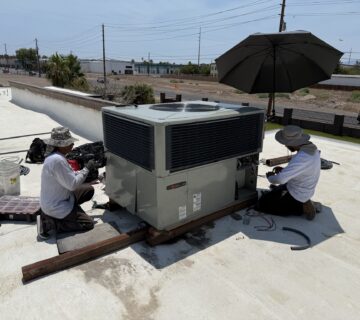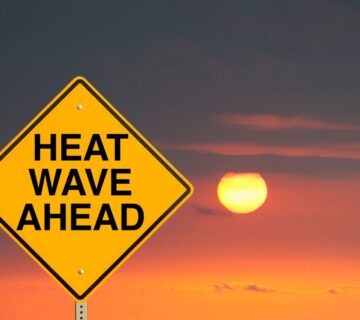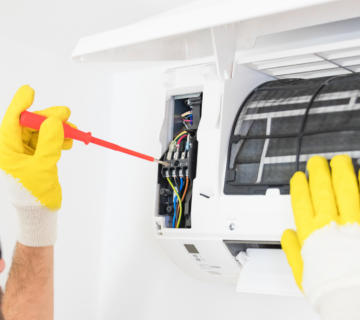The decision to repair or replace your AC unit can be difficult. A newer system is typically more efficient, and requires less maintenance and repairs, making it less expensive year after year. However, new AC units can be expensive. When does it make sense financially to upgrade your system? This online calculator is designed to estimate as accurately as possible the actual savings you’ll get from purchasing a new ac unit.
Typical Annual Operating Cost of an AC Unit, Based on SEER Rating:
Assumptions made for the calculations below include:
- 3 Ton Air conditioner
- NV energy charge per KWH is $0.12
- Average hours used for cooling annually is 2200 hours
Equation: Tonnage X 12000 (btu’s) / SEER Rating / 1000 (to get KWH) X Hours of use (estimated at 2200 in Las Vegas) X cost per KWH ($.1215 per NV Energy)
Using these average parameters the operating costs of each unit is
10 SEER Annual operating cost is $962
11 SEER Annual operating cost is $875
12 SEER Annual Operating cost is $801
14 SEER Annual Operating cost is $687
16 SEER Annual Operating cost is $601
18 SEER Annual Operating cost is $534
20 SEER Annual Operating cost is $481
Real-World Factors Not Taken Into Consideration
Unfortunately, the math above represents lab conditions and not real-world applications. Things that can change these numbers (for the better or for the worse) are all things that your HVAC contractor can advise you on. They include:
- Annual maintenance. Keeping your current system clean is probably the number one thing that affects efficiency. A 1/8” of dust on your blower motor can reduce the airflow of your system by up to 30% according to a study done by Texas A&M
- Monitoring parts for deficiencies. An inspection by a qualified HVAC contractor/technician can identify a failing run capacitor that will cause a motor to run at higher amps. The higher the amp draw on your motor, the more power that your system uses. This is one reason why a 10 SEER can potentially be operating at the same efficiency of an 8 SEER
- How you use your system matters. The formula above represents a 3 Ton HVAC system running approximately 2200 hours per year, the average here in Las Vegas. Things that can change this number include setting your temperature extremely low during the summer. Any thermostat set above 78 degrees will decrease the costs, and any setting set below 78 degrees will increase your energy consumption. This also means if you are like my wife and like Arctic type conditions in your home during the summer, a high-efficiency system may make more sense due to the longer run times your system is going to experience so that you can turn your home into a meat locker. You would not want a low-efficiency system trying to meet that extra need.
- A poorly insulated home will change the heat load on your home and increase the run time on your unit. You wouldn’t necessarily want to only increase the efficiency of your new air conditioner to overcome the insufficient insulation in your home. That is equivalent to “Not seeing the forest for the trees”. It would be a much better idea to make sure your home is properly insulated before upgrading your A/C unit.
- Improper installation of either your air conditioner or ducting system. Things like line-set length/sizing, duct sizing, proper duct installation, static pressure, gas pressure, and filtration systems can all greatly affect your system’s performance. Even if your home is inspected by a municipal or county inspector, they are not looking for things like static pressure or duct sizing. They are not looking to see if the unit is properly sized for the heat load, that the ducting is too small or too big for the unit, or what the gas or static pressure is in the system. All of these types of deficiencies and inefficiencies can, however, be overcome by your installing technician or if your system is already in place your local HVAC service company.
Real-World Example of How to Calculate Savings on a New AC Unit
The example below uses a 12-year-old, 3-ton air conditioning and heating system, repairs costs today are $500, and a SEER rating of 10. We’re also assuming the new system would be a 16 SEER option
- The life remaining on your system. (An expected life for an A/C system in the desert is 10-15 years): 3 Years
- Today’s repair cost: $500
- Utility overpayment (Use the estimated savings calculated under the annual operating estimated costs): $361
- (a) Estimated annual future repairs (What do you think you will spend every year to keep the system up and running over life of current unit): $300
(b) Annual Club Membership or Maintenance: $100 - Subtotal (3+4): $761
- Inflation (3% historically X [subtotal] $761 X 3 years left): $2283
Cost for existing system for 3 years + today’s repairs ($2283 + $500): $2,783
$2783 that could be applied to a new system that will give you peace of mind or reliability of a new system running at decreased energy costs.
Amount saved from ditching the older AC unit: $2,783
Inflation costs avoided by switching now: $720
Total saved by switching to a new AC System: $3,503
Investment in a new system in 2020: ($8,000 – $2,783) = $5,217
Using inflation of 3% you can assume that if you wait 3 years the cost of this same system will have gone up to $8741. This means in three years’ time, if your system adheres to these averages, you will be paying $720 more for the same system plus you will have spent an additional $2783 in maintenance/repair costs.
Ultimately we try to never give our customers recommendations as we never know where a customer is financially or what their long term/short term goals are for their property. This should only be used as a tool to help you make the best decision for you and your family.
Repair or Replace Your Old AC Unit?
The decision to repair or replace your old AC unit is often challenging. That’s why we developed this article and calculator – we want to equip you with the best information available to help make that decision. If you’re still not sure if you’re ready to purchase a new air conditioner, contact us and let us help. Once you’re ready to make the decision, we’re available to help with any AC repair or new AC installation.



